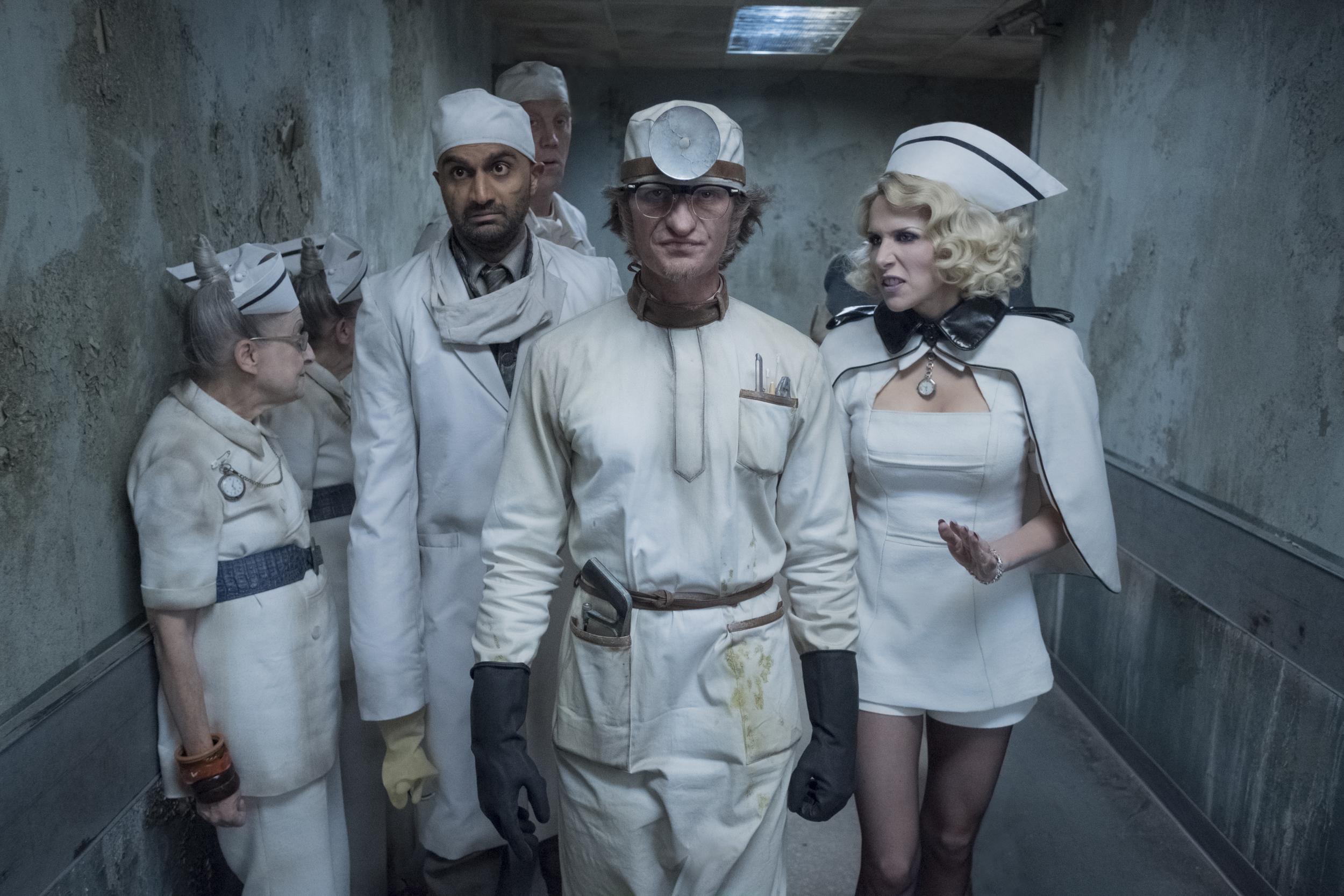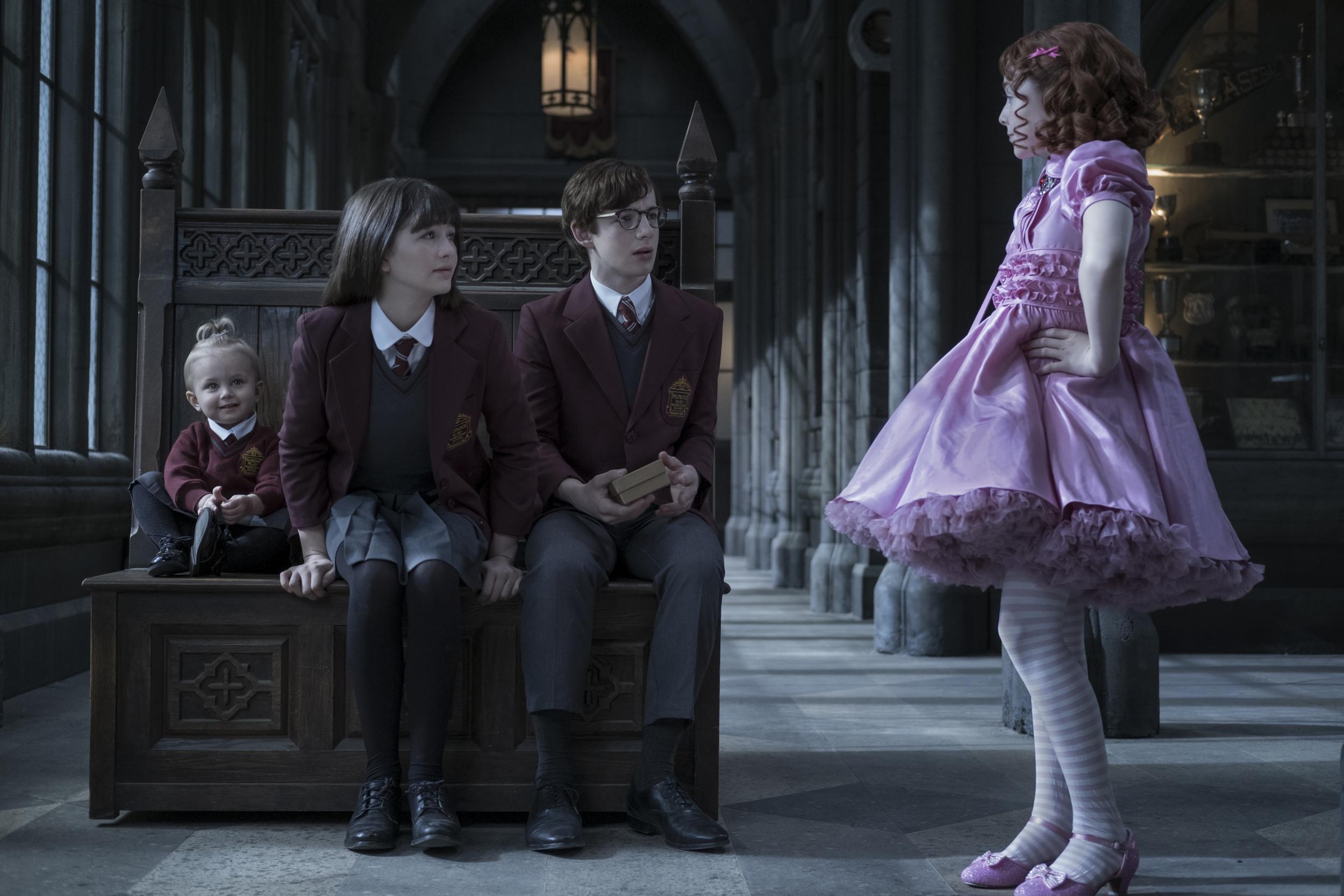A Series of Unfortunate Events season 2 review: Misery makes a welcome return
Yet despite the terrors that may face the Baudelaires, Netflix's series champions the heroism of curiosity and learning

Your support helps us to tell the story
From reproductive rights to climate change to Big Tech, The Independent is on the ground when the story is developing. Whether it's investigating the financials of Elon Musk's pro-Trump PAC or producing our latest documentary, 'The A Word', which shines a light on the American women fighting for reproductive rights, we know how important it is to parse out the facts from the messaging.
At such a critical moment in US history, we need reporters on the ground. Your donation allows us to keep sending journalists to speak to both sides of the story.
The Independent is trusted by Americans across the entire political spectrum. And unlike many other quality news outlets, we choose not to lock Americans out of our reporting and analysis with paywalls. We believe quality journalism should be available to everyone, paid for by those who can afford it.
Your support makes all the difference.Netflix’s A Series of Unfortunate Events, in its first outing, proved an utter delight to fans; a careful adaptation of the first four books in the Lemony Snicket series (penned, in reality, by Daniel Handler), delighting in its expansive vocabulary, its narrative tricks, while weaving in a few clever deviations.
After Paramount’s 2004 film failed to ignite a franchise, it felt now like justice had finally been served to the Baudelaire orphans, on the run from the villainous Count Olaf after the death of their parents in a mysterious fire leaves them with a dangling inheritance. However, with season 2, Netflix was truly faced with a test of their creative mettle.
A small part of the charm of the Lemony Snicket books was an almost fairytale-like sense of cyclical repetition: the Baudelaires would be dropped off to some new location or parental guardian, Count Olaf would appear (generally in disguise) with a dastardly new plan, and the orphans would be forced to calculate an escape.
A structural approach that offered two sensations: first, a feeling of warm familiarity, akin to sinking oneself into a favourite armchair. Second, the incurable sensation of despair felt by the Baudelaires, unable to free themselves from the pattern of devastation.
Luckily, the books could always save themselves from a feeling of exhaustion: they were fairly short in length, concise, and separated by their publishing dates. All things their Netflix adaptation can’t lean on, especially when binge culture so prominently reigns. And so the show’s creative team are tasked with a reformulation: keep faithful to the storylines, while preventing boredom from kicking in.
At least they still have wry, meta humour in their corner; Lemony Snicket (Patrick Warburton)’s continued central role as both onscreen narrator, and character in the story, still allows the language of Handler’s book to thrive.
But, by this point in the series, Netflix has kicked into a confident pace with its own sense of humour: the literary jokes, slapstick, and irony are all comfortable bedfellows.
In one moment, we’re served a classic slice of farce as an auction descends into chaos, witnessing almost every character we know scrambling to make a bid on a mysterious box. In another, the show finds silly, creative joy in nodding straight to its audience: Olaf at one point stares right into the camera after exclaiming, “I hate boring television”.
Or in the show’s opening, which sees the Baudelaires - Violet (Malina Weissman), Klaus (Louis Hynes), and Sunny (Presley Smith) - sat on a bench in Prufrock Preparatory School, just where we left them off last time.

Watch Apple TV+ free for 7 days
New subscribers only. £8.99/mo. after free trial. Plan auto-renews until cancelled

Watch Apple TV+ free for 7 days
New subscribers only. £8.99/mo. after free trial. Plan auto-renews until cancelled
There’s one noticeable difference, considering how Smith’s clearly grown in the gap between filming. Onscreen, Klaus brushes it off: “I feel like we’ve been waiting so long Sunny is starting to look less like a baby and more like a toddler.”
Neil Patrick Harris continues to delight in Count Olaf’s shambolic theatricality: season 2 certainly provides in terms of musical numbers and terrible disguises - the latter increasingly rash in the face of so many foiled plans, as he poses as Prufrock’s Coach Genghis, who wears a turban for “religious reasons”, but can’t even name the religion in question, or auctioneer Gunther, who sails by on the pretence he’s from an unnamed European country, only because foreigners happen to be very “in” amongst the city’s elite.
However, as much as his Olaf may lean into bouts of clumsiness and incompetence, we can already see the inklings of the deep, wounded bitterness that comes into focus in the book series’ later instalments. Count Olaf may remain a fairly two-dimensional villain as of now, but there’s something brewing underneath all the pantomime.
Indeed, the story of the Baudelaires complicated increasingly with each passing novel; though its fictional universe wasn’t as aggressively lore-filled as its contemporaries (the Harry Potter series, for example), passing chapters would offer insight into the deepening mystery of V.F.D., its connecting strands, and the solidifying idea that Baudelaire fire was no mere accident.

Netflix’s version absolutely revels in the idea: in the introduction of an expanded storyline for the Baudelaire’s adult allies, anchored by V.F.D. members Jacquelyn (Sara Canning) and Larry (Patrick Breen), and with Nathan Fillion’s introduction here as Jacques Snicket, brother to Lemony. Sara Rue also plays a crucial character here redressed as a librarian at Prufrock Preparatory School.
Not only does it help plump up each episode’s narrative arcs, but there’s an emotional effect to be found, too. A Series of Unfortunate Events’ television adaption feels, oddly, more hopeful than its literary origins: in the face of such dire circumstances, we are reassured that the Baudelaires will always have sure allies in this world. That they will not be alone in their fight for decency.
Add to that the Quagmire triplets Duncan (Dylan Kingwell) and Isadora (Avi Lake), who also lost their parents, and brother Quigley, in a mysterious fire; with their arrival at the end of the first season, we now see the Baudelaires take a more active role in their own lives, pushing back against their own victimisation while they battle to aid their friends and uncover the mysteries at hand.
The V.F.D. members’ beefed up narratives only add to this sense of rousing adventure; they help also in the shift experienced during the books, moving away from the Baudelaire’s encounters with hapless encounters and towards the Baudelaire’s encounters with hapless institutions - a strange kind of emotional maturation for the orphans, as they’re launched headfirst into the illogical world of adults.
We already witnessed the start with last season’s The Miserable Mill, and it’s ludicrous employment policies; now we must face The Austere Academy’s failing educational system consisting of recalling anecdotes, measuring various objects, and administrative tasks.
Or the maze-like penthouse of socialite Esmé Squalor (played by Lucy Punch, who delightfully turns it into the second coming of Cruella De Vil), where the myopic financial elite are lavishly parodied with lines like: “If we give money to poor people, then they won’t be poor anymore and we won’t have anyone to feel sorry for.”; meanwhile, The Vile Village and The Hostile Hospital lampoon society’s fixations on the superficial markers of order, rules and bureaucracy. Only in this world would you unironically hear the cry of: “Paperwork makes the world go round.”
A Series of Unfortunate Events uses the lens of the Baudelaires to lay bare this ever-present hysteria, in which personal cowardice or selfishness overthrows all sense of reason. The message is very clear here: adults have made a real mess of the world.
A presumed ally, Hector (Ithamar Enriquez), is eager to come to the Baudelaire’s aid, but only if there’s “some way to help without being challenging or really scary”.

But that is where Lemony Snicket’s rallying cry comes to the fore: that there is courage in curiosity, and in remaining open to all the world has to teach you. Decency and a love of learning can be the makings of a hero, the rejection of those virtues the sign of a villain.
V.F.D. members will consistently find wisdom in great literature, the Baudelaire’s own passions always save the day (Klaus is a voracious reader, Violet an inventor, Sunny a lover of biting things). Meanwhile, the spoiled brat of Prufrock Preparatory School, Carmelita Spats (Kitana Turnbull), takes one look at the library and exclaims: “I don’t know what the building is and I never go in there.”
All themes that bear an unexpected relevance to the world we see today; it’s almost unavoidable, in fact, when the show essentially deals with thoughtful, intelligent young people battling to speak up against an illogical world.
And if there’s a purpose to its relevance, it’s this: A Series of Unfortunate Events champions resilience. As much as it may revel in the miserable, the purpose of its own morbidity is to offer the assurance that hope lives in even the darkest of places.
“In a world too often governed by corruption and arrogance, it can be difficult to stay true to one’s philosophical and literary principles,” utters a coded phrase of the V.F.D..
But as the Baudelaires prove over and over again in their actions, it’s something worth fighting for.
A Series of Unfortunate Events hits Netflix on 30 March.